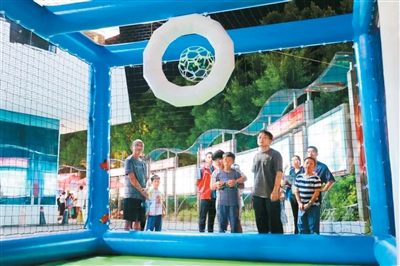




- BRNN
- BRI News
- BRNN News
- Database
Official Documents Polices and Regulations
Inter-government Documents International Cooperation BRI Countries
Business Guide Economic Data BRI Data
Trade
Investment Projects Latest projects
Cases - Content Pool
During the National Day holiday in early October, science museums across China offered night tours, giving visitors a new way to celebrate the holiday and explore the wonders of science with their families and friends.
Liu, a Shanghai resident who lives near Zhangjiang Science City, quickly booked tickets for her family of four when she heard that the Shanghai Natural History Museum would extend opening hours during the holiday.

A visitor plays drone soccer during a night tour at the Fujian Science and Technology Museum in southeast China's Fujian Province. (Photo courtesy of the official account of the Fujian Science and Technology Museum on WeChat)
"I had taken my two daughters to museums at night before, but never during the National Day holiday," Liu said. "They found the experience wonderful as they explored the mysteries of dinosaurs and gazed at the starry sky. It was joyful for all of us."
Centered on its special exhibition China's Dinosaur World, the museum hosted a weeklong night program that transformed the venue into a lively, immersive "science lab after dark." The event offered interactive experiences for different audiences, ranging from themed explorations for families with children to activities appealing to young adults. The goal was to ensure every visitor could discover their own adventure, turning static dinosaur exhibits into engaging science experiences.
Visitors stepping into the museum's dinosaur hall on Oct. 7 became "science detectives," piecing together paleontological evidence to solve imaginary cases, an engaging way to bring prehistoric mysteries to life.
As science museums become more interactive and creative, their educational role is evolving. Rather than merely presenting knowledge, they now invite visitors to experience science firsthand, sparking curiosity and imagination.
In southeast China's Fujian Province, the Fujian Science and Technology Museum embraced the trend. Its night tour program featured drone light shows that brightened the skyline, telescopes for real-time stargazing, and a bustling science fair. More than 30 science-themed activities drew thousands of participants.
By extending its opening hours, the museum met public demand for evening visits while weaving science education into the city's vibrant nighttime culture.
Across the province, similar initiatives were held during the holiday. The Fuzhou Science and Technology Museum, for example, extended its hours to 8 p.m. and offered themed educational tours.
Industry analysts said the popularity of science museum night tours during the holiday offers valuable insights for the future development of public science education services.
The public's enthusiasm for evening visits, they said, highlights the need for more regular, accessible and diverse nighttime science programs. This may mean science museums need to explore sustainable mechanisms for weekend or Friday night tours while balancing operational needs such as staffing, costs and safety.
They noted that science museums should move beyond conventional exhibitions, reimagining themselves as nighttime spaces for social connection and learning. This shift transforms museums from "places to visit" into experiential platforms that foster creativity and teamwork.

Tel:86-10-65363107, 86-10-65368220, 86-10-65363106